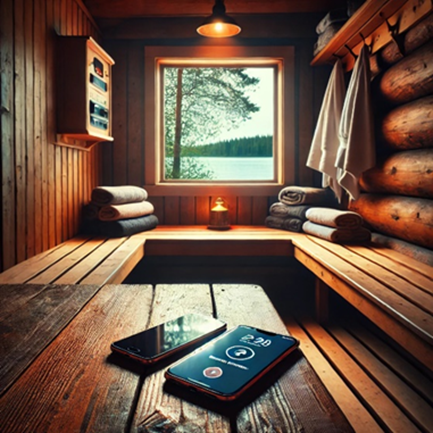Finland has ranked as the happiest country in the world for multiple years in a row. Could Finnish sauna culture have an impact on this high level of happiness? That might be the case.

The Sauna: Where relaxing meets tradition
Sauna is an essential part of Finnish culture and well-being. The roots of this thousands of years old tradition date back to the Bronze Age, when the sauna was operated with stones heated in a pit. The smoke sauna was developed during the Iron Age, and at the beginning of the 19th century the stove was equipped with a chimney. The sauna has served as a center of life in many ways: in addition to bathing, it has been used for childbirth, treating illnesses, and rituals that have brought people together. Bathing in a sauna has traditionally also been about cleansing and calming the mind, and the silence of the sauna has promoted spiritual well-being. Sauna culture is still an important part of Finnish life, although the customs associated with it have become more modern. (Laukkanen and Laukkanen 2020.)
Sauna bathing has become a common way to relax, cleanse the body, relieve stress, and it also causes hormonal reactions that may explain the stress release and health benefits. However, its effects, such as the feeling of relaxation, vary from individual to individual. (Henderson etc. 2021.) Sauna to Finns has been more than a place for bathing for generations. It has been the silent living room of the home where people have shared stories, silence and connections to each other. To this day, many social gatherings include a sauna, for example get-together with friends, midsummer sauna and a bridal sauna.
Screenless sauna- a place for true interaction

Have you ever thought about sauna in its social sense, or more precisely, in its non-social media sense? We hadn’t before either. Nowadays, screens are everywhere and are present in everything, whether it’s in different social contexts or just being alone. Almost everyone has the need to check their phone in these situations or look for an answer to a thought or question that just came to mind. Does it sound familiar, “hey, I’ll just quickly check this” or “wait a minute, I’m in the middle of this” and the true interaction is already partially ruined.
Are we slowly becoming slaves to the screen that controls so many situations in our everyday lives? This is where the importance of the sauna comes into play, perhaps as one of the only screen-free places where we can be present to ourselves and others without the distraction caused by a screen. In the sauna, people chat, talk about news, laugh, joke, or even cry. Everyone’s opinion is heard whether it’s family, friends, or even new acquaintances in a public sauna. Sauna fosters a sense of community and helps us strengthen social relationships, and we gain experience that we can cope without hiding behind a screen.
Lindfors (2007, 21 – 37) writes that communities have positive effects on health. Engström et al. (2022, 6) again highlight that the most important motives for sauna use are “social – meeting friends and chatting with them”. Finnish people are usually not very talkative, but in the sauna they tend to even talk to strangers. The sauna therefore serves as an excellent place without technological stimuli and helps us relax and calm down, as well as recover from the stress of the day.
“Have you ever thought about sauna in it’s social sense, or more precisely, in its non-social media sense?”
Connect, unwind, and heal – the social power of the sauna for your mental well-being
Studies show that sauna users have a positive outlook on life and have a higher perceived quality of life than those who use saunas less. Sauna has been found to increase feel-good hormones. (Laukkanen and Laukkanen 2020.) Engström etc. (2022, 5) also found greater levels of happiness reported by people who sauna bathed 1–4 times a month compared to people who sauna bathed less frequently. In some long-term studies, regular sauna users have also been found to live longer (Laukkanen and Laukkanen 2020).
According to Laukkanen and Laukkanen (2020), men who use the sauna 4–7 times a week have a 78% lower risk of developing psychotic symptoms compared to men who use the sauna once a week. Sauna promotes mental health and the feeling of belonging to a community, because you can be there without roles and titles. The sauna is a place of equality where people can meet each other without prejudice, and in more than one sense, naked. Taking a sauna together offers an opportunity to share experiences and strengthen the bonds of community and friendship. (Laukkanen and Laukkanen 2020.) Sauna is more to Finnish people than a place of relaxation. It could also be the secret to their happiness. Health benefits, stress relief and social connections make the sauna more than just a tradition.
Now, put your screen away, heat the sauna and relax!
Writers
Humala Saila, Kantanen Tiina, Paananen Elsi, Sutinen Noora and Virtanen Annika. Students of Welfare and Health Coordinator Master’s Degree Programme at Savonia University of Applied Sciences.
Pehkonen Pirjo, Peteri Juha and Savela Sanna. Lecturers at Savonia University of Applied Sciences.
Sources:
Engström, Å., Hägglund, H., Lee, E., Wennberg, M., Söderberg, S., &; Andersson, M. (2024). Saunominen Pohjois-Ruotsissa: MONICA-tutkimuksen tulokset 2022. Kansainvälinen sirkumpolaarisen terveyden lehti, 83(1). https://doi.org/10.1080/22423982.2024.2419698 Accessed 1.2.2025.
Henderson K., Killen L., O’Neal Eric. and Waldman H. 2021. The Cardiometabolic Health Benefits of Sauna Exposure in Individuals with High-Stress Occupations. A Mechanistic Review. Int J Environ Res Public Health. Jan 27;18(3):1105. 10.3390/ijerph18031105. Accessed 11.1.2025.
Laukkanen T. and Laukkanen J. 2020. Sauna, keho & mieli. Docendo Oy. Jyväskylä.
Lindfors, P. 2007. Tutkimuksia, kokemuksia ja ajatuksia yhteisöllisyyden terveysvaikutuksista. Psykoterapia 1/2007;26(1):21–37.
